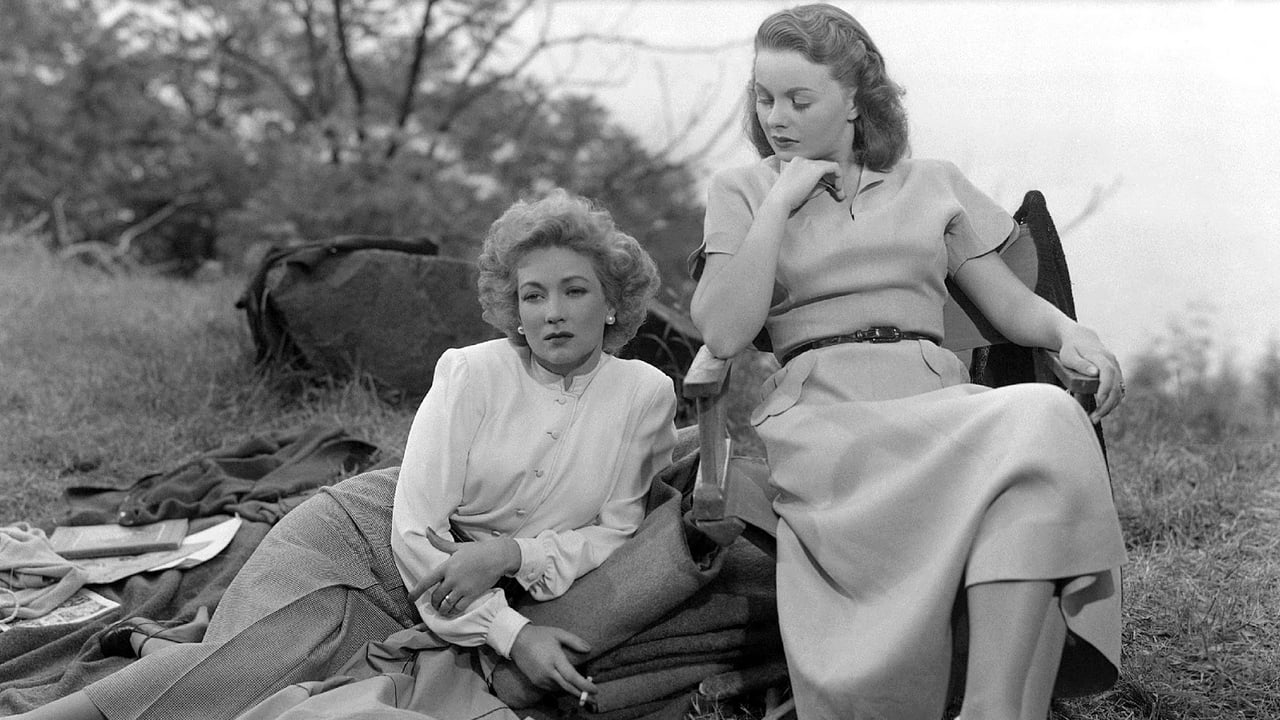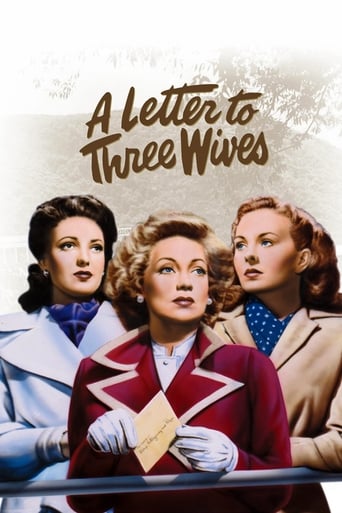

Yawn. Poorly Filmed Snooze Fest.
... View MoreThe joyful confection is coated in a sparkly gloss, bright enough to gleam from the darkest, most cynical corners.
... View MoreThis is a gorgeous movie made by a gorgeous spirit.
... View MoreOne of the film's great tricks is that, for a time, you think it will go down a rabbit hole of unrealistic glorification.
... View MoreNoir makes for not only powerful drama, but it can also be associated with satiric comedy. A very good example of this association is Joseph L. Mankiewicz's A Letter to Three Wives (1949), particularly in the Paul Douglas and Linda Darnell finale sequence. Kirk Douglas also plays a noir character, although his episode is much less guilt-charged and is lightened considerably by the not-coming-down-too-hard playing of Ann Sothern as the ambitious-for-Kirk wife. And Kirk does have an obvious, not-so-hard way out of his dilemma, whereas Paul Douglas and Linda Darnell are trapped in a situation not easily resolved. In fact, Paul has a job and a half as he endeavors to make the resolution convincing. That he succeeds so brilliantly is a measure of a really fine actor! (The Fox DVD rates 10/10 in my book).
... View MoreI was drawn into watching this movie because it was a mystery. Three wives get a letter from a woman saying she left town with one of their husbands, yet all 3 have to spend the day on a boat full of poor kids wondering via flashbacks if it was their husband. It seemed to be a unique spin on the classic 40's mystery. Actually more unique than I first thought.Of course there was the 40's stereotypes, when women were "broads" and men were "big gorillas" or "mugs". And of course, both sexes were always dressed to the teeth. But if this portrayal of the high life in the 40's were accurate, the entire generation would have died before 1950 of alcohol poisoning from drinking martinis every few minutes, or of lung cancer from chain smoking filterless cigarettes.But as I continued to watch, the first thing I noticed was "one of these things is not like the others". That being the casting of Paul Douglas as one of the husbands. 3 woman, considered hot by 40's terms and one of their husbands looks like Larry, Moe and Curly's dad? Seriously miscast and a blaring flaw in the believability of the film. I get that she married him for his money, but Moe's dad? Not buying it.Then, it got really strange. Suddenly, during the flashbacks, you hear sound effects that sound exactly like the auto-tune effect used by today's pop stars. At first I thought I was imagining it, or maybe somebody slip acid into my coffee. But there it was, auto-tune in a 40's flick, apparently achieved via "talk box", which I thought wasn't available till Walsh and Frampton used it in the 60's. Anyway totally unexpected, yes, ahead of it's time, but at the same time extremely freaky.But the plot drags along until you lose track of how many cigarettes and martinis are consumed. You keep waiting for one of the wives to call their husband a "big lug"... or for one of husbands to say "why I oughta" or "why you" and give Paul Douglas a double eye poke or maybe hit him in the head with a lead pipe followed by a boink sound effect. Better yet a boink sound effect using auto-tune.Then as the story winds down in eager anticipation awaiting to find out which big lug left his wife to run away with some unknown dame who only has a name, you pretty much know the ending. But at the same time you never really know due to the vagueness of Moe's dad. Was he making up his confession to cover for who they led you to believe it was? Or, was he really just a "big gorilla" whose dame (aka:broad) forgave him? The world may never know (or be able to consume that amount of alcohol and nicotine) but the glass that falls over for no reason and breaks at the end may only help add to the mystery rather than solve it.
... View MoreJoseph L. Mankiewicz won a best director Academy Award for this film dealing with a letter written by Addie Ross, addressed to one of three wives whose husband she ran off with: Jeanne Crain plays Deborah Bishop, married to a successful man(played by Jeffrey Lynn) with whom she feels uncomfortable in his country club set; Lora Mae Hollingsway(played by Linda Darnell) viewed as a gold digger, even by her husband(played by Paul Douglas) and Rita Phipps(played by Ann Sothern) whose career she fears may drive away her husband(played by Kirk Douglas). Which one has lost their husband? Well-acted and directed film is really a glossy soap opera(and shaggy dog story), yet remains interesting, just overpraised.
... View MoreThis is an interesting and thoughtful movie, very well done, with absorbing stories. I think it was tied together well. Good characters and portrayals. It's not a comedy. Life has its humor as you go along, but there's more serious business going on here, and it is handled as such. People refer to this as one of Kirk Douglas' early weak roles, but I think his character exhibited real strength in standing up to his wife about the compromise in her writing. That was a strong scene. They were the soundest couple of the three, being attractive together as well. Linda Darnell is of course quite beautiful, and I thought very competent in this. The character had an interesting and actually disciplined system for her pursuit of a man who would get her out of the railroad flat. Understandable. How was she a floozy? She operated from home and took her mother out with her when she married. She beat the man at his game, which was to use them and lose them. Should she have been another of his casualties? Of course, neither are very secure in their marriage, given their shaky foundation. But there's a reckoning with their respective motivations through the Addie experience.Have never understood Paul Douglas as a leading man. He's downright unattractive. Good actor maybe, but not believable as an eligible man. The story here is a poor girl out to snag a rich guy, and that is accomplished for obvious reasons. But that the famed and beautiful Addie Ross would want to run off with him stretches the imagination.Ann Sothern seemed to step up in this role. Isn't this the strongest production for her? She's always been a B movie player, to my observation. She brightened up anything she was in, even very low productions. I think she did this very well, and could have done more at this level. She is strong and thoroughly attractive, inside and out.To me, Jeanne Crain is rather average, and am surprised that she was considered by some to be beautiful. She is convincing in girlfriend, sister and daughter parts, but not much more than that. She's an insecure wife here and manages that alright. Her character was a mess, having to be propped up by everyone around her, but grows and stabilizes. Jeffrey Lynn. Wish more would have been done with him. He's one of those really attractive people who don't work out somehow. That's more what a leading man should look like, but guess the performances didn't come up. Loved him in "Four Daughters," admittedly a lesser film. But would have liked to have seen him more. Maybe he could have been like Lee Bowman, the good looking other man. I would have been right there ogling ... lolConnie Gilchrist and Thelma Ritter are super treats. I don't know what shakes up that kitchen more, the local coming through or all that snappy dialog. Great character players, always effective. This is a very interesting movie that doesn't disappoint, either as it goes along or as it wraps up. I don't agree that it's a bad ending. Consider how outrageous this one woman was to their lives, hanging over them like a cloud throughout. Yet, all three couples come out strengthened, and the spell is broken. It's the smug Addie Ross that ends up being jilted. Great ending.
... View More